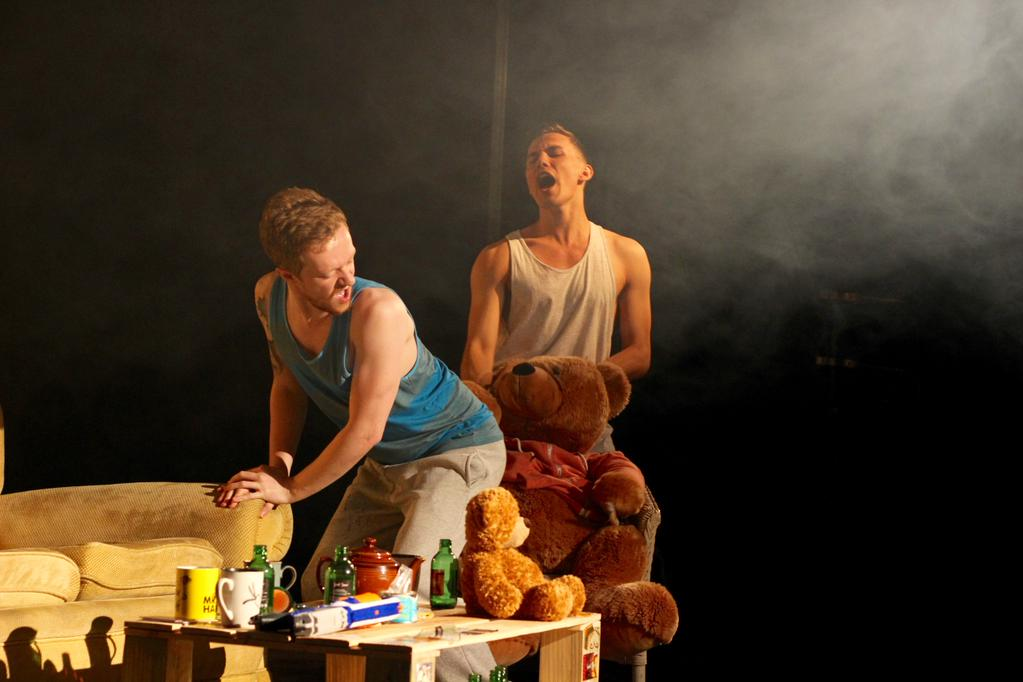Penetrator, a Play by Anthony Neilson
An Analytical Exploration of Masculinity, Trauma, and Power Dynamics in Contemporary Theater
Reza Shirmarz
The interplay of masculinity, trauma, and psychological violence forms the foundation of a compelling theatrical narrative that examines the fragile construct of male identity and its relationship with power and vulnerability. Set within the confines of a shared living space, the drama intensifies the interplay of its three male characters. It exposes the fissures in their relationships and the devastating consequences of repressed emotions. Through its taut dialogue and psychological complexity, the work interrogates themes of toxic masculinity, friendship, and the cyclical nature of violence as presenting a harrowing exploration of human behavior.
Masculinity emerges as a central motif, depicted as a constructed and contested identity. The three male characters represent varying aspects of masculine performance, and their interactions underscore the fragility of this construct. Max’s performative masculinity manifests through humor and aggression, mechanisms he uses to dominate and deflect emotional vulnerability. When Alan expresses discomfort over Tadge’s knife, Max trivializes his concerns, quipping, “You’re too sentimental. The teddies like to fuck.” This line not only undermines Alan’s perspective but also reinforces Max’s veneer of bravado. In contrast, Alan embodies a quieter introspective masculinity defined by empathy and moral boundaries. Although he often succumbs to Max’s derision, his discomfort with violence and his eventual assertion of agency, “Tell him to put it away or he’ll have to leave. Or I will”, position him as a counterpoint to the aggressive masculinity that dominates their interactions. Tadge’s militarized masculinity introduces a destabilizing force, shaped by the hyper-masculine ethos of the military and the psychological scars of his experiences. His paranoia and fixation on “The Penetrators” reflect a desperate attempt to reclaim agency in the wake of trauma.The theme of trauma, both individual and collective, drives the narrative’s psychological tension. Tadge’s fragmented recounting of his abuse blurs the line between reality and delusion. It challenges both the audience and the other characters to discern the truth. His description, “They drugged me. I never saw their faces. They’d bring me round every now and then so they could do more things to me”, is delivered with a mixture of rage and vulnerability, which lays bare his profound psychological distress. The “black room” where Tadge claims he was held functions as a potent symbol of isolation, repression, and the inescapable weight of his past. This motif externalizes his internal chaos and, thus, represents both a literal and metaphorical space where his identity and autonomy were eroded. Tadge’s inability to escape the figurative black room becomes the catalyst for his erratic behavior, as he re-enacts his trauma in increasingly violent ways.
Male friendship in this narrative is depicted as a fragile and volatile bond, fraught with competition, mistrust, and unspoken grievances. Nostalgia serves as a tool for reconciliation, particularly in Max’s efforts to pacify Tadge. Invoking childhood memories, Max recounts, “Shite Hawkins bust my lip open, and you went and found him by the waste ground … You kicked his cunt in for me!” This shared history shows the deep loyalty between the characters, yet the strain of their current situation reveals how tenuous such bonds can be. Tadge’s projection of his paranoia onto Alan, accusing him of complicity in the abuse, shatters any illusion of trust. Furthermore, his declaration, “You’re no friend of Max. You’re only friends with your own dirty kind,” exemplifies how trauma isolates him from those around him and transforms friendship into suspicion and hostility.
Violence is a pervasive theme in the narrative, both as a literal and symbolic mode of communication. Tadge’s reliance on violence to assert control and express his anguish reflects the destructive cycle of trauma. The knife, a recurring symbol of power and threat, becomes a focal point for the play’s tension. Tadge’s threat to Alan, “Confess or the teddy bleeds like an Arab”, is a grotesque and dehumanizing moment. This illustrates his descent into madness and his struggle to externalize his suffering. The destruction of Alan’s teddy bear is particularly significant and clearly marks the intrusion of violence into a space of innocence and comfort. Through such acts, Tadge channels his unresolved pain, while Max and Alan are forced to confront the implications of their inaction and complicity. Despite its dark themes, the narrative employs humor as a counterbalance. It provides brief moments of levity that humanize the characters and diffuse tension. Max frequently uses humor to mask his vulnerabilities as delivering irreverent remarks such as, “Imagine if you had a fetish for shagging dinosaurs. You’d be pretty fucked, wouldn’t you?” This absurdist humor offers a reprieve from the escalating psychological stakes and highlights the characters’ reliance on humor as a coping mechanism. However, this levity is always tinged with unease, as it underscores their inability to address their deeper emotional wounds.
Ambiguity plays a crucial role in shaping the narrative’s psychological complexity. Tadge’s trauma and his claims about “The Penetrators” are never fully substantiated. They leave both the characters and the audience in a state of uncertainty. This ambiguity forces a confrontation with the nature of truth and perception, as well as the broader implications of trauma and its effects on memory and identity. Tadge’s declaration: “They stick things up you. All sorts of things”, elicits both skepticism and empathy. It reflects the difficulty of processing extreme experiences and the societal stigma surrounding male vulnerability. Overall, through its exploration of masculinity, trauma, and the fragility of human connection, this play presents a harrowing critique of societal norms and the psychological toll of violence. The interplay between the characters, marked by moments of camaraderie, conflict, and betrayal, encapsulates the complexities of male relationships and the pervasive impact of unaddressed trauma. By blending visceral dialogue, dark humor, and psychological depth, Neilson's narrative offers a profound commentary on the human condition and invites its audience to grapple with uncomfortable truths about identity, power, and the lasting scars of violence.







Comments
Post a Comment